- Moving India Forward
- Mahindra Truck & Bus
- Ashok Leyland
- Apollo Tyres
- Automotive Research Association of India
- ARAI
- Asian Trucker
- Tyre Trends
- Tata Motors
- MAN Trucks
- Continental India
- Tyresoles India
- Volvo Trucks
- Dr Seshu Bhagavathula
- Rashmi Urdhwareshe
- Dr Venkat Srinivas
- Rahul S. Mahajan
- Sudeepth Puthumana
- Prashant Kakade
- Ministry of Road Transport & Highways
- MoRTH
- SKP Amarnath
- Apollo Tyres
- Vijay Shrinivas
- TREA
- Tyre Retreading Education Association
- Indag
- Mahesh Babu
- Switch Mobility
- Anil Baliga
- EKA Mobility
- Boddapati Dinakar
- VECV
- Shailesh Zinge
- Cummins India
- A Ramasubramanian
- Blue Energy Motors
- Bal Malkit Singh
- All India Motor Transport Congress
- AIMTC
- Prasanna Patwardhan
- Bus & Car Operators Confederation Of India
- BOCI
- Sanjay Sasane
- Institute of Driving Training and Research
Safety And Sustainability Take Centre Stage At Commercial Vehicles Conference 2024
- By MT Bureau
- November 26, 2024
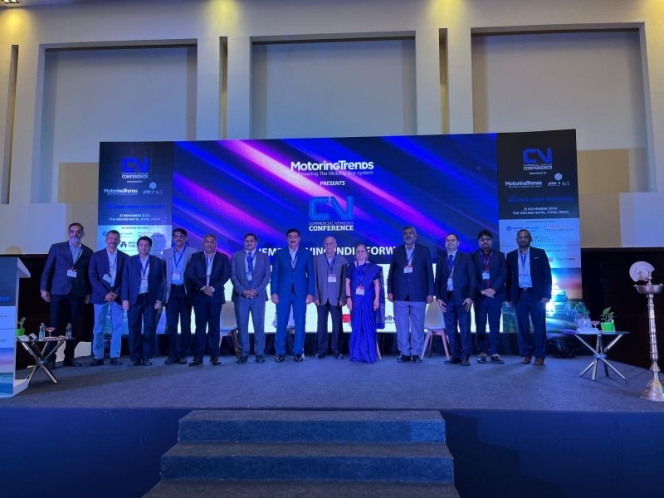
India’s commercial vehicle (CV) industry is rapidly aligning with global standards, thanks to policy reforms, evolving customer expectations and a robust domestic ecosystem. Automakers and suppliers are making significant strides in cost competitiveness, safety innovations and integrating alternative energy solutions. As the sector continues to evolve, the need for collaboration and strategic discussions has never been more critical.
Recognising this imperative, Motoring Trends, a leading automotive magazine, hosted its inaugural Commercial Vehicles Conference on 21st November 2024, in Pune, India. Themed ‘Moving India Forward’, the event served as a platform for industry leaders, including OEMs, suppliers, technocrats, fleet operators and industry partners, to address challenges and identify opportunities shaping the future of the Indian CV landscape.
By bringing together stakeholders from across the value chain, the conference underscored the importance of collective action in driving innovation, enhancing safety standards, and adopting sustainable practices. As the CV industry transforms to meet global benchmarks, such forums are vital to ensuring India’s leadership in the sector while addressing its unique market dynamics and needs.
Mahindra Truck & Bus, Ashok Leyland and Apollo Tyres supported the event as sponsors, while Automotive Research Association of India (ARAI) was the Associate partner, while Asian Trucker and Tyre Trends were the Media partners. The delegates at the event attended from a range of companies such as Tata Motors, MAN Trucks, Continental India, Tyresoles India, and Volvo Trucks among others.
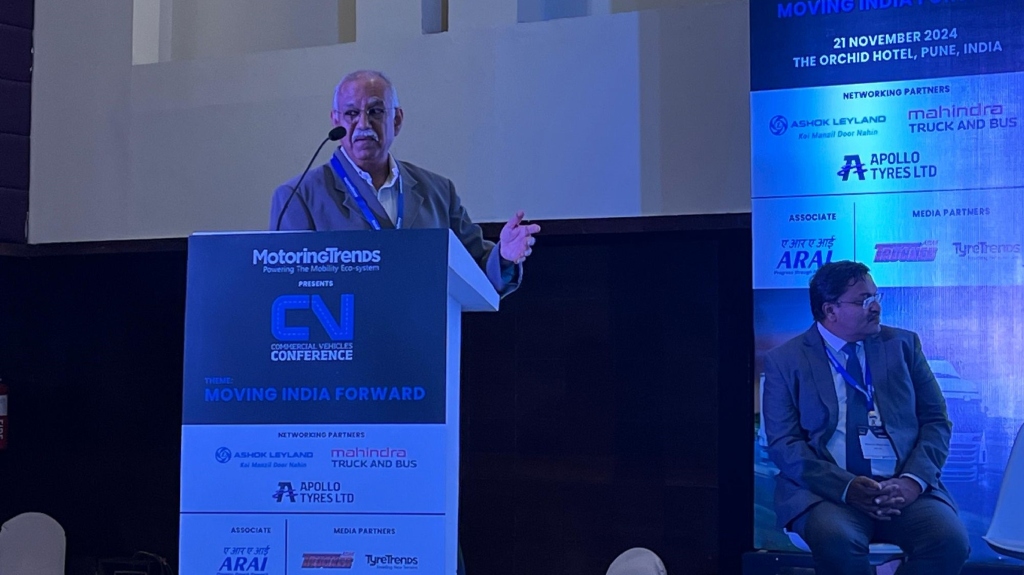
The event kicked off with Dr Seshu Bhagavathula, Director, CityQ and an automotive industry veteran delivering the Keynote address, where he highlighted how urban cities around the world are working to decongest and decarbonise their streets. “This (decongestion and decarbonisation) requires a serious relook and focus on improving urban mobility as well as the role of alternative energy to support the transition,” Dr Bhagavathula.
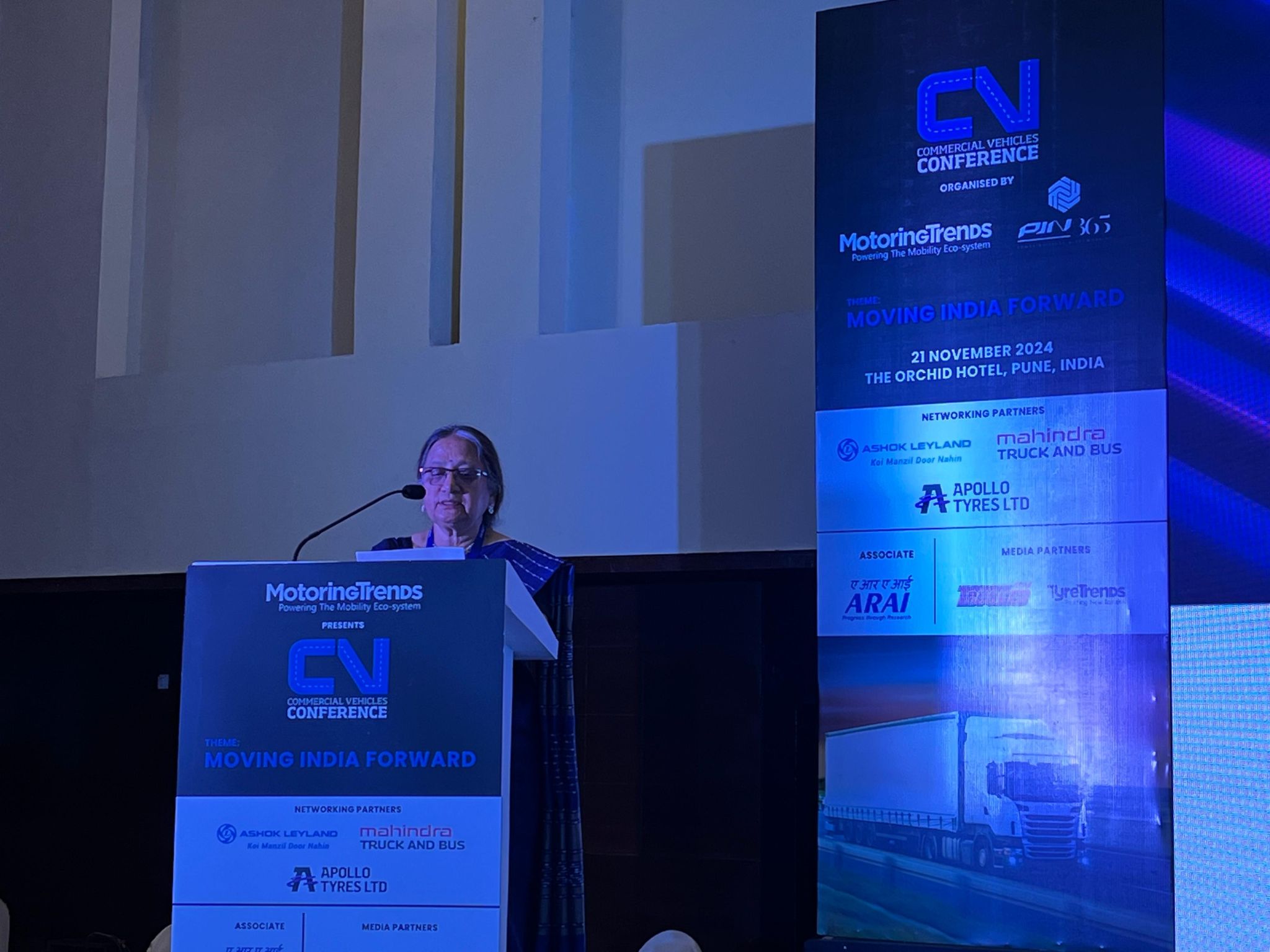
Rashmi Urdhwareshe, Former Director, Automotive Research Association of India (ARAI) shared her perspective on how the automotive industry has been focussing on not just introducing the latest technologies, but also co-developing solutions to meet the India-specific needs. She emphasised the close cooperation between testing agencies, suppliers and OEMs that is accelerating the transition to the latest technologies.
Making commercial vehicles safer
The commercial vehicle population on Indian roads accounts for a small parc of the total vehicles, but ranks 3rd when it comes to the vehicles involved in road accidents. In 2022, more than 460,000 accidents took place in India, which resulted in over 168,491 people losing their lives and over 443,366 people being injured.
The first panel discussion of the day focussed on one of the most important aspects pertaining to the CV industry – Safety. The panellists for the session included – Dr Venkat Srinivas, Head Of Business, Mahindra Truck & Bus; Rahul S. Mahajan, Deputy Director, The Automotive Research Association of India (ARAI); Sudeepth Puthumana, Head of Segment – ADAS, Autonomous Mobility, Continental Automotive India and Prashant Kakade, Ministry of Road Transport & Highways (MoRTH).
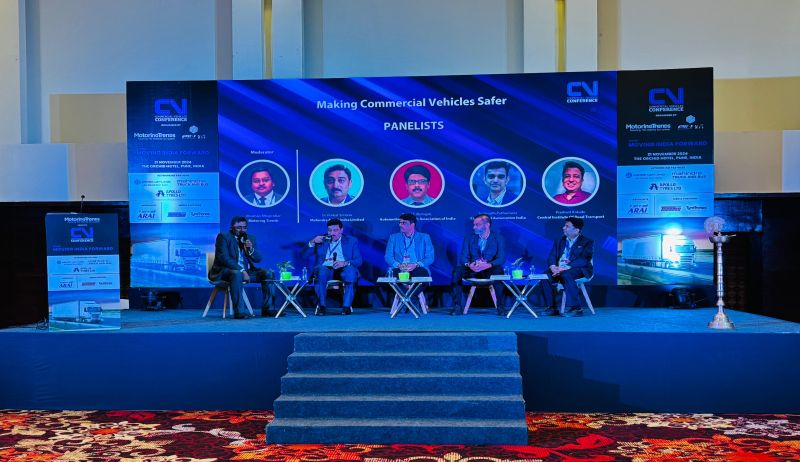
The session, moderated by Bhushan Mhapralkar, Editor, Motoring Trends, touched upon various factors ranging from ADAS technology, and road designing to driver training and sensitisation.
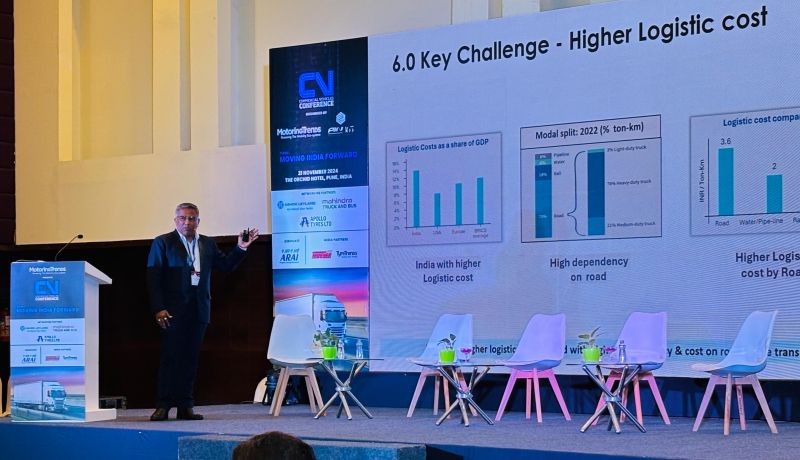
SKP Amarnath, Group Head - R&D, Apollo Tyres gave a presentation on ‘Commercial Vehicle (Truck) Evolution In India And Impact On Tyres’. He dwelled into the key developments that have taken place in the CV industry and how tyres can play a key role in influencing vehicle safety and efficiency.
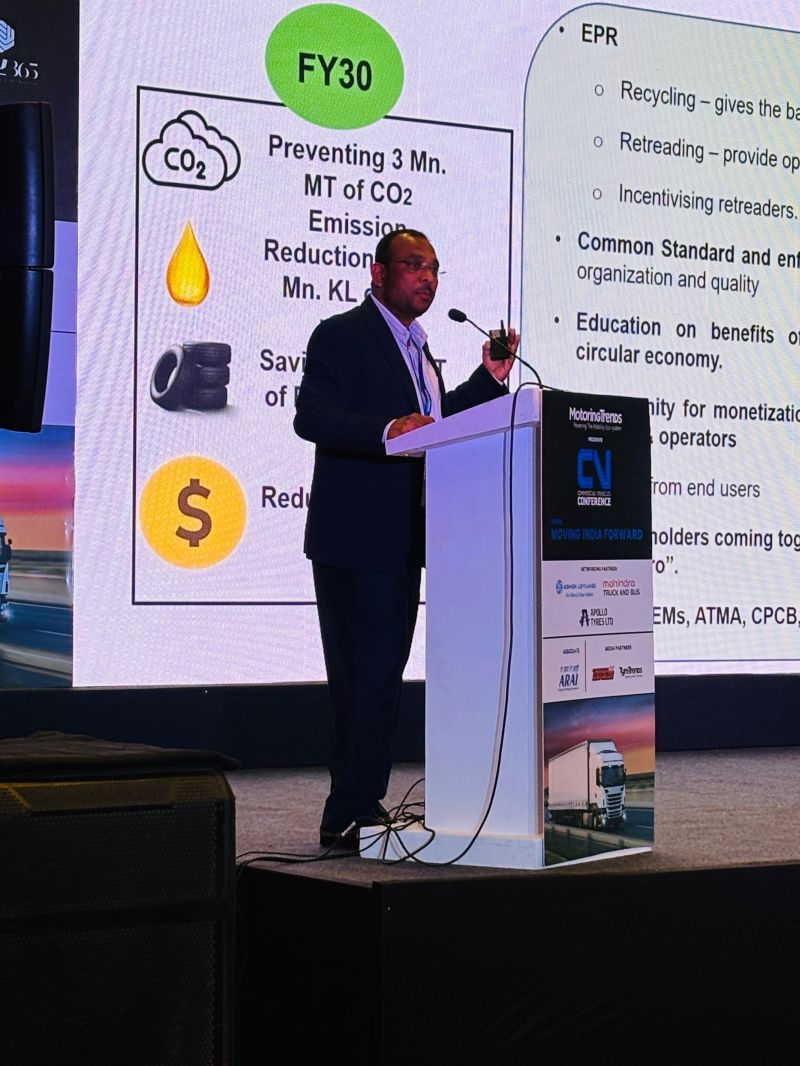
Vijay Shrinivas, Member, TREA - Tyre Retreading Education Association and CEO, Indag, gave a presentation on ‘Driving Sustainability and Circularity in Commercial Vehicle Industry’. He presented his thoughts on how treading not only helps save costs on tyre replacement but also enables higher circularity and thus helps reduce carbon emissions too.
Alternative energy & future of commercial vehicles
The role of alternative energy has been a key topic of discussion globally across vehicle segments. While there has been a focus on electrification in certain vehicle classes, the commercial vehicle segment will need to adopt a mixed approach depending on the application and use case.

The second panel discussion was on the topic of Alternative Energy and the Future of Commercial Vehicle. The panellists – Dr Bhagavathula ; Mahesh Babu, CEO, Switch Mobility; Anil Baliga, President, EKA Mobility; Boddapati Dinakar, Executive Vice-President, Sales & Marketing, Volvo Trucks, VECV; Shailesh Zinge, Director - Marketing, Growth Initiatives and Program Management, Engine Business, Cummins India and A Ramasubramanian, CTO, Blue Energy Motors presented their perspective on the alternative fuel segment.
The session was moderated by Nilesh Wadhwa, Assistant Editor, Motoring Trends.
The discussion focussed on how industry stakeholders were exploring various energy mix ranging from electric, LNG to future fuels such as hydrogen and fuel cells. The panellists agreed that globally too at present there was no single fuel that could completely overhaul the commercial vehicles segment. There was a need to not only focus on the vehicles but the necessary charging/refuelling ecosystem.
Transport ecosystem
The health of the CV industry is one of the key barometers to understand a country’s economic prosperity. While one can discuss the trends, policies and technologies, it is imperative that the views of the key stakeholder – fleet operators – are taken into account.
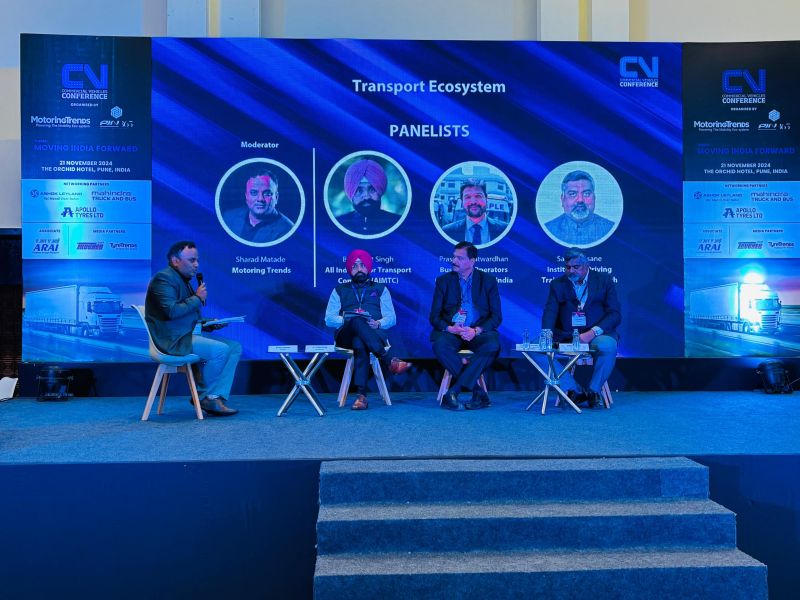
The third panel discussion of the day was on the topic of ‘Transport Ecosystem’. The panellists for the session were - Bal Malkit Singh, Chairman - the Core Committee, Former President, All India Motor Transport Congress (AIMTC) Prasanna Patwardhan, President, Bus & Car Operators Confederation Of India (BOCI) and Sanjay Sasane, Principal, Institute of Driving Training and Research (IDTR).
The session, moderated by Sharad Matade, Executive Editor, Motoring Trends, had an indepth discussion on how fleet operators continued to face headwinds ranging from increases in operational expenses, driver shortages and road infrastructure among others. At the same time, the revenues had not kept up at the same pace. The panellists also presented their perspectives on the adoption of newer technologies and alternative fuels.
Atul Patil, Vice-President – Marketing, Pin 365 delivered the Vote of Thanks.
Gulf Oil Lubricants Inks Strategic Partnerships With ACE, Ammann India And XCMG
- By MT Bureau
- January 19, 2026
Gulf Oil Lubricants India has established strategic alliances with three construction equipment manufacturers – ACE (Action Construction Equipment), Ammann India and XCMG. These agreements are intended to expand the company’s presence in the infrastructure segment by providing equipment-specific lubricants for the Indian market.
As part of the collaboration with ACE, Gulf has added new products to the ACE Genuine Oil range, covering machinery such as cranes, backhoe loaders, motor graders and tractors. For Ammann India, which holds a 60 percent market share in asphalt mixing plants, Gulf will serve as the official partner for its entire equipment range. This includes the development of formulations for future machinery. Additionally, Gulf will launch branded lubricants for XCMG to support its range of construction equipment within India.
Alongside these alliances, Gulf has introduced a range of specialised products including fire-resistant hydraulic oil, zinc-free hydraulic oil and CEV V diesel engine oil. These formulations are engineered to meet the requirements of new-generation equipment while improving uptime and reducing the total cost of ownership for contractors.
The company currently manages over 50 OEM associations across the automotive, industrial, and construction sectors. These partnerships are a component of Gulf’s strategy to provide technical services and product selection tailored to Indian operating environments.
Ravi Chawla, Managing Director & CEO, Gulf Oil Lubricants India, said, “Infrastructure has been a strategic focus area for Gulf for over 15 years, and these partnerships mark a significant step forward in strengthening our presence in this growing sector. By working closely with leading OEMs like ACE, Ammann, and XCMG, among others, we are able to deliver application-specific, future-ready lubricant solutions for new generation equipments that help customers improve equipment reliability, reduce downtime, and optimise total cost of ownership. We firmly believe that long-term value is built through strong, enduring partnerships.”
MAN Truck & Bus Plots EUR 1 Billion Investment In Germany By 2030
- By MT Bureau
- January 17, 2026
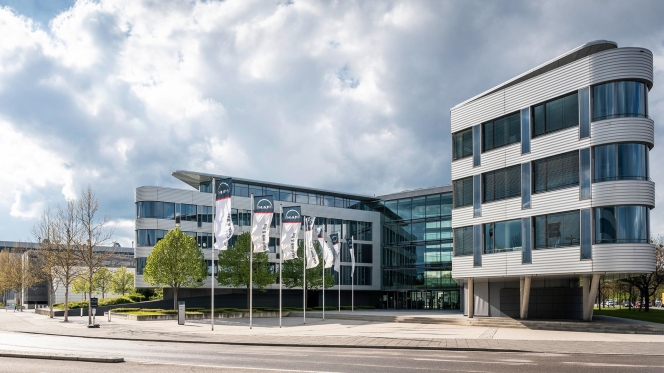
German commercial vehicle major MAN Truck & Bus has reached an agreement with employee representatives and the IG Metall union on its MAN2030+ programme. The initiative is designed to reduce costs by approximately EUR 900 million by 2028 while funding investments of almost EUR 1 billion in the company’s German locations by 2030.
The programme includes the development of vehicle generations based on the TRATON Modular System (TMS). Production and R&D investments will be made in Germany and Eastern Europe, where the group plans to establish a battery factory to support the transition to electric heavy-goods vehicles and buses.
The agreement secures the jobs of employees at MAN Truck & Bus in Germany until at least 2035, with a potential extension to 2040 based on sales and earnings performance. All German production sites will be retained. The company plans to adjust its workforce by 2,300 jobs over the next decade through natural fluctuation and demographic trends, avoiding redundancies or severance schemes.
Alexander Vlaskamp, CEO, MAN, said, “Following intensive negotiations, we have now reached agreement with our employee representatives on the implementation of key cornerstones of the MAN2030+ program. The plan secures MAN’s competitiveness and guarantees our customers a broad product portfolio as a full liner, which forms the basis for the company’s future success. This will enable us to secure the jobs of our current employees also in the future. With our continued high level of investment in Germany, we are fulfilling our industrial policy responsibilities. We will now consistently implement the long-term MAN2030+ program in order to counteract intensifying competition, changing market conditions and major regulatory risks at an early stage."
The EUR 900 million cost reduction will be achieved through savings in material and overhead costs, as well as sales performance improvements. The company has ruled out wage cuts and committed to continuing profit-sharing payments and above-tariff benefits.
Karina Schnur, Chairwoman of the General Works Council, MAN Truck & Bus, said, “The discussions were not easy, but they were always respectful and constructive, and from the perspective of co-determination and IG Metall, they have now resulted in the best possible compromise for our employees and the company. The agreement sends a very strong signal regarding the security, stability, and future prospects of our employees. With this agreement, we are securing the jobs of our colleagues at MAN until at least the end of 2035. And we are doing so without interfering with collectively agreed benefits. In addition, we were able to agree on profit sharing for employees and the payment of benefits above the collective agreement level – which means that MAN will remain an attractive company for future generations. Furthermore, we are securing the long-term preservation of our German locations. At the same time, we are creating the freedom to continue investing significantly in our German locations and the future of MAN.”
The programme also prioritises vocational training, with MAN committing to hire trainees amounting to at least 2 percent of the permanent workforce annually. By the mid-2030s, the company expects to employ approximately 13,000 staff across its German operations.
Volvo–Eicher Establishes Regional Competency Development Centre At VNR VJIET
- By MT Bureau
- January 13, 2026
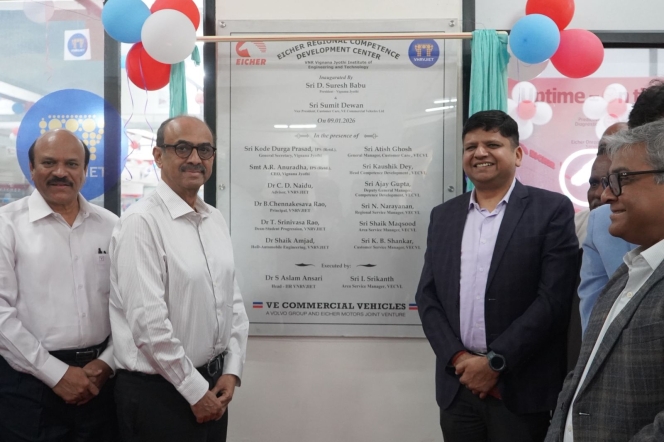
In a strategic commitment to cultivating advanced technical expertise in South India, Eicher (VE Commercial Vehicles Limited) has established a long-term Regional Competency Development Centre at VNR Vignana Jyothi Institute of Engineering & Technology (VNR VJIET) in Hyderabad. This significant investment underscores Eicher's dedication to fostering industry-ready talent and enhancing the practical skills of its own workforce and network. The centre, inaugurated for an initial 10-year term, represents a core component of Eicher's vision for collaborative innovation and sustainable skill development within the automotive sector.
The newly inaugurated facility is equipped with a comprehensive range of operational vehicles, including diesel and electric models, alongside specialised diagnostic equipment and cut models of vital automotive systems. This infrastructure is designed to provide immersive, hands-on learning for Eicher employees and dealer partners from the Telangana and Andhra Pradesh regions. Furthermore, it creates a vital bridge to academia, offering students and faculty from key engineering disciplines direct exposure to current industry technologies and real-world automotive systems within their academic environment.
This initiative is fundamentally driven by Eicher’s objective to support sustained knowledge advancement and create a robust pipeline of skilled professionals. By enabling structured training on modern vehicle technologies, the partnership actively contributes to shaping the future of the automotive industry. It reflects Eicher's proactive approach to integrating industry practice with engineering education, thereby strengthening the ecosystem that supplies the next generation of engineers and technicians.
D Suresh Babu Garu, President, Vignana Jyothi, said, “Being selected by a global automotive leader such as Volvo–Eicher to host a Regional Competency Development Centre is a strong validation of VNR VJIET’s focus on industry-aligned education. This collaboration strengthens our commitment to providing students with the best facilities, real-world exposure and future-ready skills that meet national and global standards.”
Sumit Diwan, National Head – Customer Care, VE Commercial Vehicles Limited, said, “This Centre reflects our long-term approach to capability building and talent development. By investing in advanced infrastructure at VNR VJIET and training students alongside our workforce, we are creating a strong pipeline of skilled engineers equipped for evolving automotive and electric mobility technologies. We plan on hiring students from Automobile Engineering (AE) department and encourage greater participation of female students in the recruitment process.”
BillionE Mobility Secures USD 25 Million To Expand Electric Trucking Fleet
- By MT Bureau
- January 13, 2026
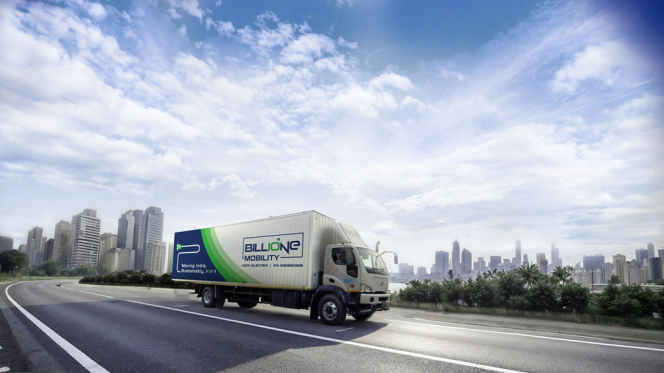
BillionElectric Mobility (BillionE) has raised USD 25 million in a growth capital round consisting of equity and debt. The funding was provided by a consortium of family offices, ultra-high-net-worth individuals and financial institutions, including the State Bank of India (SBI).
The capital is intended to transition the company from deployments to commercial operations in electric freight. A portion of the funds will support the rollout of 500 electric trucks during the FY2026-27.
BillionE Mobility currently maintains a pipeline of over 1,500 electric trucks planned for the next three years to meet demand from industrial customers.
The fleet will serve logistics for sectors including cement, automotive, metals, and e-commerce. These industries are targeted due to predictable routes and high utilisation levels, which facilitate the transition to electric vehicles.
BillionE Mobility is executing a strategy across freight corridors. These routes are being electrified by CHARGE ZONE, an affiliated company providing the charging network for the fleet. The integration aims to deliver operational efficiencies and reductions in emissions across industrial clusters.
Sanjeev Kulkarni, CEO and Co-Founder, BillionE Mobility, said, “This fundraise comes at a defining moment for electric commercial mobility in India. We are moving beyond pilots to scaled, real-world deployments where execution, reliability, and economics matter most. The capital will allow us to accelerate fleet expansion, strengthen operational readiness, and deepen partnerships with customers committed to decarbonising their logistics. Our vision is to make electric trucking a mainstream, dependable, and commercially viable choice for India’s freight ecosystem.”
Kartikey Hariyani, Founder and Chief Platform Architect of BillionE Platform, added, “I am personally indebted and grateful to our existing and new shareholders backing our vision of an Energy Transition platform enabled by electric mobility in commercial segments. Currently we are on a growth path of 120 percent on YoY basis and would like to maintain this momentum in coming months and years. Fortunately, EV trucking has achieved the total cost of ownership (TCO) at par with diesel on specific routes and use cases, especially 19T and 55T category, and this is indeed a huge boost.”
The company intends to use the investment to capture a share of the commercial vehicle market while lowering carbon intensity in freight logistics.



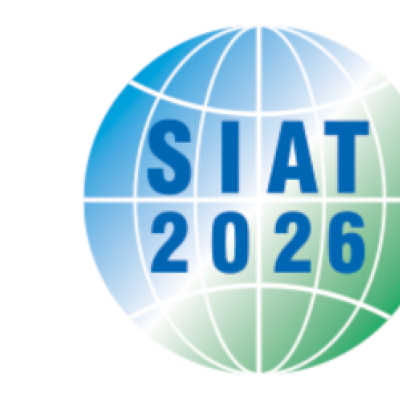



Comments (0)
ADD COMMENT